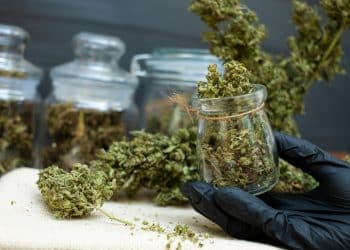The masses are getting involved in cannabis and hemp extraction. This is nothing new, nor the marketer’s paradise that these industries provide. Discussions of double winterization or distillation abound, but when you employ these different techniques depends on what products you’re looking to create.
In short, winterization utilizes cold ethanol to partition waxes from crude oil. This could be done for several reasons, like improving palatability, but it’s vital for products meant to be inhaled like oil going into vape cartridges. Cannabinoids can stick to the isolated waxes, so washing the isolated wax with cold ethanol can help rinse desired molecules away from what’s to be discarded (or repurposed).
Double winterization repeats this process to get residual waxes out, but processing labs should calculate mass loss and concomitant potency increase to see if this is a worthwhile endeavor for themselves and/or their clients.
Distillation further refines a winterized oil, boosting potency. Terpenes are fractionated off as are other ingredients like pigments and minor cannabinoids. This means that distillate is not considered to be “full-spectrum” in the true sense of the phrase and not the convenient usage that some employ to mean a specific number of cannabinoids (I’ve heard some people say four cannabinoids equals full-spectrum).
You can recombine terpenes with distillate and even further refine what partitions into the non-distillate, non-terpene round-bottom collection flask. But distillate, as is, isn’t full-spectrum. Winterized oil, however, should contain some terpenes and minor cannabinoids and, therefore, would be considered full-spectrum, just not as full-spectrum as crude oil. A lab analysis will confirm for sure.
The main decision-making that should design your product refinement blueprint is what type of products you’re looking to make. Want creams, lotions, salves? A decarboxylated crude oil might be just the ticket, since those plant waxes may be wanted, natural, topical ingredients.
Vending vapes? Again, getting those waxes out is critical, so you might do several winterizations until waxes are no longer collected, or you may just pass a winterized oil through your distillation setup. Winterized oil specifically for vape cartridges doesn’t technically need to be decarboxylated since the heat generated from the vaporizer coil will decarboxylate THCA (tetrahydrocannabinolic acid) or CBDA (cannabidiolic acid) to delta-9-tetrahydrocannabinol and cannabidiol, respectively.
Although the temperature used during wiped-film distillation would normally decarboxylate acidic cannabinoids, the residence time that the oil sees heat is short-lived. Attempting to decarboxylate within the distillation setup, should it actually occur, would release gaseous carbon dioxide, which can be problematic but not impossible to navigate.
Tinctures can be prepared from crude or winterized oils, or distillate. Obviously, these must be decarboxylated no matter what oil is used such that neutral, active cannabinoids can work their phytomedicinal magic. Yes, crude oil tinctures might be a bit vegetal and linger on one’s tongue, but they’ll also contain the most diverse assortment of extracted molecules. There’s a reason why Rick Simpson Oil is popular, and it’s certainly not the taste.
Distillate tinctures might be cleaner looking, more translucent, and lighter on the palate. But they’re also further evolved along the path to one-dimensionality, meaning loss of molecular spectrum.
Thus, the key to product refinement is deciding what products you’re looking to create. Perhaps you’ll need to do a little organoleptic blueprinting (see the upcoming article in the Jan-Feb 2020 edition of Extraction Magazine for a wonderful example regarding Olala’s creation of a palatable cannabis root beer) to evaluate different products’ sensory characteristics and marry that data to your certificates of analysis.
But that’s all the fun part… the design of products which enables manufacturers to flex their creativity and hone their artisanal craft.
Image Credit: Big Sky Scientific












